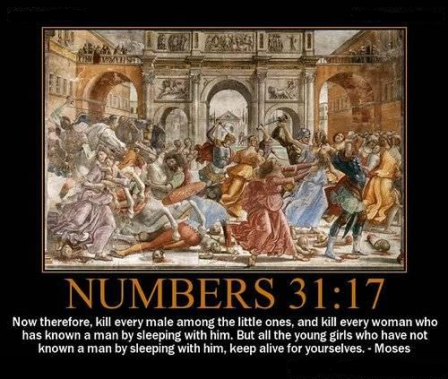“You can’t reason someone out of a belief they weren’t reasoned into.” I really could have included this in Part 1 as the very first entry, since this may well be the single most insidious, self-defeating, and quite simply wrong (and yet despite all this, maddeningly common) cliché in the entire atheist lexicon. Matt Dillahunty once served up as thorough an eviscerating of this cliché as one could possibly imagine, to which I have very little to add. But on a personal note, I will just say that I’ve spoken with hundreds of atheists about their “deconversion” stories, and I can count on one hand the number who were not “reasoned out” of religion, regardless of what their initial reasons for believing may have been.
“It is easier for a rich man to go through the eye of a needle than for him to enter the kingdom of heaven”. While not as egregious an example as the “slay them before me” passage, this is also an example of a Bible verse that’s often unfairly taken out of context when attempting to point out the absurdity of the Bible, or simply to make the claim that the Bible says the rich cannot enter heaven. After all, the passage immediately following it makes clear that it’s intentionally describing a physically impossible scenario in order to make the point that even seemingly impossible things are possible “with God”. There are plenty of actual errors, absurdities, and contradictions in the Bible. This isn’t one of them.

“If there’s a god, why does he allow so much evil and suffering in the world?” For many atheists (and theists), this is the big one. Even Bart Ehrman–who has perhaps done more than anyone else to educate the public about the Bible’s countless flaws and contradictions–cites the Problem of Evil as the main issue which led him away from theism. But the Problem of Evil is only a disproof of the traditional Judeo-Christian notion of an omniscient, omnipotent, omnibenevolent God, not all “gods” in general. And such a god concept is no more probable than a “god” which is apathetic (or even evil), or a god which has limited power. If anything, the traditional god concept is inherently LESS probable (if not impossible) simply due to the logically contradictory nature of having mutually exclusive attributes, which renders the Problem of Evil something of a moot point. In other words, while we have plenty of reasons to disbelieve in the existence of gods, just because God may be an asshole (which the God of the Bible certainly is) doesn’t mean he doesn’t exist.
“Extraordinary claims require extraordinary evidence”. The problem with invoking this phrase to dismiss religious claims is that it implies that the claim in question has “ordinary” evidence going for it, but simply lacks “extraordinary” evidence. But that’s FAR too generous when it comes to most religious claims, which typically fail to meet even “ordinary” standards of evidence (and in many cases lack any evidence whatsoever beyond an unsupportable claim of divine revelation).
For the rest of the series:
Atheist Clichés to Avoid – Part 1
Atheist Clichés to Avoid – Part 2
Atheist Clichés to Avoid – Part 3
Atheist Clichés to Avoid – Part 4


